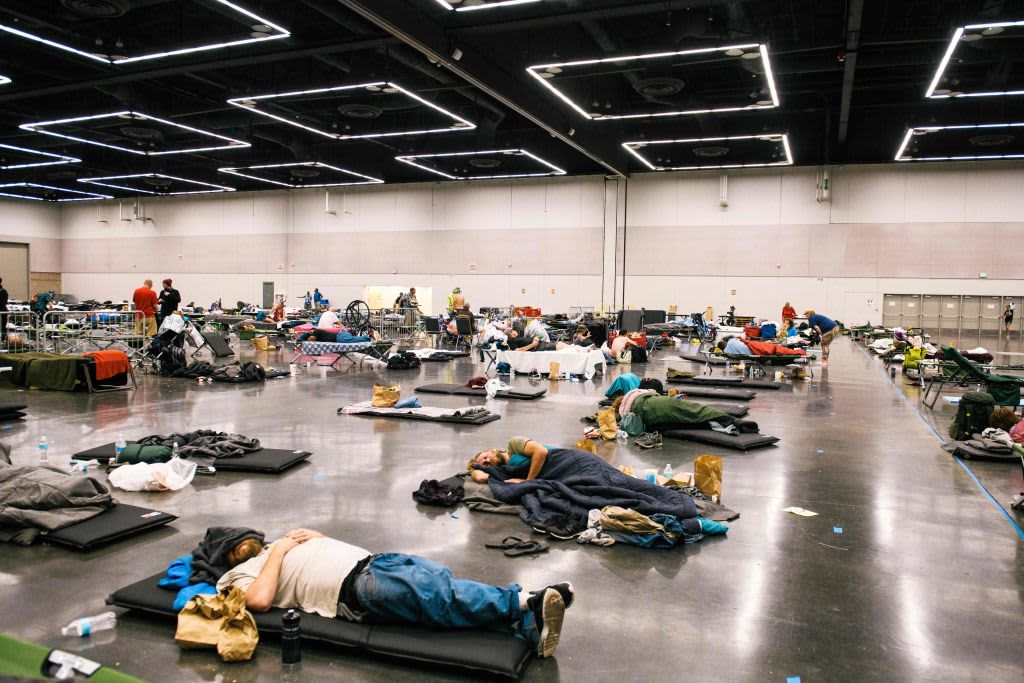On June 28, 2021, people take a break at the Oregon Convention Center cooling station in Portland, Oregon, as a heat wave sweeps throughout much of the United States. Getty Images | Kathryn Elsesser | AFP Hundreds of people have died in Oregon, Washington, and British Columbia in the last week as a result of the catastrophic heat wave that has burnt most of the Pacific Northwest and generated record high temperatures in Canada. Since Friday, at least 63 individuals have died in Oregon due to excessive heat, according to the state medical examiner’s office; 45 of those deaths were reported in Multnomah County, which encompasses Portland. Temperatures in the region reached a record high of 116 degrees Fahrenheit. The tentative cause of death, according to Dr. Jennifer Vines, Multnomah County’s health officer, was hyperthermia, or an excessively high body temperature caused by the body’s inability to deal with heat. Many of the victims were discovered alone and without access to air conditioning. “In a statement, Vines added, “This was a true health catastrophe that has shown how devastating an excessive heat wave can be, especially to otherwise vulnerable people.” “I know many county people were keeping an eye out for one another, and I’m extremely grieved by the preliminary death toll,” Vines said. “I believe we will see another incident like this as our summers become warmer.” During a hot wave in Seattle, Washington, United States, Shanton Alcaraz of the Salvation Army Northwest Division distributes bottled water to Eddy Norby, who lives in an RV, and welcomes him to their adjacent cooling facility for food and refreshments on June 27, 2021. Reuters/Karen Ducey According to Lisa Lapointe, the chief coroner of British Columbia, at least 486 sudden deaths were reported between Friday and Wednesday, with the number expected to rise. The 195 percent spike is compared to the roughly 165 deaths that would normally occur in the province over the course of five days. “While it is too early to say how many of these deaths are heat-related,” Lapointe said in a statement, “it is deemed likely that the considerable rise in mortality reported is connected to the extreme weather B.C. has experienced.” According to the medical examiner’s office in King County, Washington, which encompasses Seattle, almost a dozen individuals died from the heat on Wednesday. In Spokane, Washington, two persons were found dead in their apartments on Tuesday due to apparent heat-related stress. In a Seattle Times op-ed published Tuesday, Washington Gov. Jay Inslee wrote, “We can’t just turn up the AC; we have to turn up our level of efforts combating the root cause of our changing environment — climate change.” Inslee wrote, “Our current suffering is only the top of the melting iceberg.” “What we’ve been feeling this week is only the beginning of a global calamity.” Heat waves are becoming increasingly common and intense in the United States as a result of human-caused climate change. This week’s high temperatures coincide with the worst drought conditions in the last two decades in the West. Isis Givens-Guttierrez, 9, cools off at the Georgetown Playfield splash park in Seattle, Washington, United States, on June 26, 2021, during a heat wave. Reuters/Karen Ducey Climate change is responsible for more than one-third of global heat-related mortality during warm seasons, according to new research. Heat kills more people in the United States than any other weather disaster. Lower nighttime temperatures, which can provide comfort from the scorching daily temps, are also diminishing as the Earth heats, putting individuals without air conditioning in peril. On June 30, 2021, US President Joe Biden holds a briefing on wildfires in the Eisenhower Executive Office Building in Washington, DC, with cabinet members, government officials, and governors of several western states, notably Oregon Governor Kate Brown (on screen), ahead of the wildfire season. Getty Images | Saul Loeb | AFP In a meeting with Western governors on Wednesday, President Joe Biden said that climate change has resulted in a perilous combination of high heat and persistent drought, and that the United States is lagging behind in developing strategies to combat worsening wildfires. “Right now, we have to act, and we have to act quickly,” Obama said at the meeting, which included governors from Oregon, California, New Mexico, Nevada, Washington, Colorado, Utah, and Wyoming. “The truth is, we’re catching up.” According to the World Meteorological Organization, the Earth has already warmed by more over 1 degree Celsius relative to pre-industrial levels. To avert the worst effects of global warming, scientists have consistently advocated for immediate reductions in greenhouse gas emissions./n
Read MoreHistoric heat wave linked to hundreds of deaths in Pacific Northwest and Canada
2021-07-01T15:33:02-04:00July 1st, 2021|





